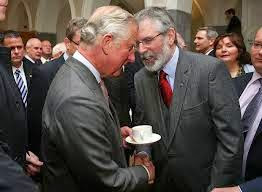 |
| The Prince and the Extremist Extraordinary cordiality |
None of this was half so ironic, for me, than the contrast to Margaret Thatcher’s attitude when she was Prime Minister. She famously talked about the need “to find ways to starve the terrorist and the hijacker of the oxygen of publicity on which they depend”. That led to one of the more risible aspects of her long and painful reign: she banned the voices of extremist organisations being heard on British TV.
This meant that for six years, we could see Gerry Adams on our TVs, we could see his lips forming the words he was pronouncing, but we couldn’t hear his voice pronouncing them: instead, an actor would dub them in over the picture. Exactly the same words, mind you. The “oxygen of publicity” denial didn’t affect his message, only his voice.
This is one of the less well-remembered aspects of the Thatcher years. I always remind her fans of it, when they present her as some kind of secular saint, as they regularly do. It was an entirely pointless act, and damaged only Britain: you can imagine how difficult it made it to argue against freedom of speech limitations in other countries.
The ban kept running after Thatcher fell, perhaps out of deference to her memory. But finally, in 1994, her successor John Major dropped it. The only people who regretted its passing were the actors who were called on to dub the voices: it had been a nice little earner for them.
Today, that same Gerry Adams met and chatted for a few minutes to the next in line to the British throne. With every appearance of cordiality. No actor was on hand to repeat his words for him. And the earth didn’t fall into the sky.
In fact, what the incident did was to strengthen the growing bonds between erstwhile adversaries in Northern Ireland, as the Queen herself did three years ago, when she met Adams’ colleague and the current Deputy First Minister of Northern Ireland, Martin McGuiness, and shook his hand.
Rather underlying the fact that if you want to bring peace anywhere, it’s a lot more effective to come to terms with your resentments, however deeply held they may be, however justified, and listen to your adversary. A lot more effective than spreading further hatred by labelling him a terrorist and extremist. And then trying to shut him up.
And if it turns out you actually can't, it’s laughable as well as ineffective
No comments:
Post a Comment